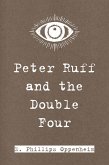This is a connected collection of short stories about the leader of a secret society pledged to protect England and their German adversary. In "The Double Four", Peter is called out of retirement by that organization, which, since his departure, has morphed into a sort of private diplomatic secret service. Peter acquires a title, some nice clothes, and a new archenemy, a German spy, Bernadine. Light hearted with a bit of romance along with the action and fancy pants English dialogue. This novel is an Oppenheim classic from 1919 about a high society villain: characteristic of Oppenheim's typical works, with the characters living in luxury, and a very flowing and exact story.
Dieser Download kann aus rechtlichen Gründen nur mit Rechnungsadresse in A, B, BG, CY, CZ, D, DK, EW, E, FIN, F, GR, HR, H, IRL, I, LT, L, LR, M, NL, PL, P, R, S, SLO, SK ausgeliefert werden.
Hinweis: Dieser Artikel kann nur an eine deutsche Lieferadresse ausgeliefert werden.









